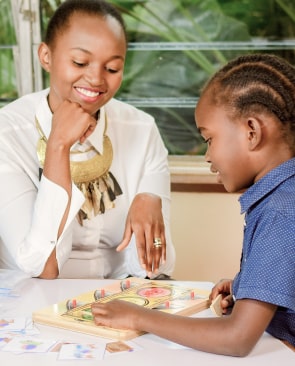Worried your child is delayed in talking? Access Module 1 of my Late Talker’s Bootcamp.
Worried your child is delayed in talking? Access Module 1 of my Late Talker’s Bootcamp.
Are you worried that your child may be experiencing learning difficulties at school or displaying behavioural issues as a result of their delayed language skills?

Understanding

Use/Speaking
Receptive language refers to comprehension skills; how much a child is able to understand and how well they are able to follow instructions of varying lengths and complexity. Language development continues throughout a child’s early years and later into teenage years however by the time a child is in school (primary school years), they should have acquired most adult-like language skills.
The following characteristics are symptomatic of a receptive language delay or difficulty:
Our speech therapists can work with children as young as 20 months to remediate language delays.

Expressive language refers to the use of language. This includes formulation of sentences, appropriate word choice, correct application of grammatical structures/ word endings (eg. past tense ‘ed, plurals -s, etc.) and/or sequencing ideas to tell or retell a story.
Difficulties with expressive language can fall under the following categories:
Difficulty understanding and using age-appropriate words/ concepts
Difficulty forming sentences that are grammatically correct for their age and/or using the correct forms (plural, past tense, etc.)
Difficulty in using language socially, i.e. appropriate initiation, maintenance and termination of conversation, turn-taking skills and appropriate use of other nonverbal behaviours during communication
A child who is experiencing difficulties or a delay with their expressive language skills may display one or more of the following characteristics:
Makes wrong choice of words when speaking or omits words
Orders words wrongly in his/her sentence
Uses incorrect grammatical structures eg. ‘his’ for ‘her’, ‘breaked’ for ‘broke’, etc.
Has poor or low vocabulary
Difficulty holding a conversation
Difficulty asking questions, making requests, making comments, re-telling a story, etc.

We offer face-to-face speech therapy sessions at one of 2 locations in Nairobi, so if this is accessible for you, we would love to support you in this way. Before any sessions commence, we would need to book your child in for an initial consultation.

Telehealth can be a viable option for children, who for whatever reason cannot access face-to-face sessions. We run successful online sessions (telehealth) for children of different ages and presenting with different communication difficulties. Before any sessions commence, we would need to book your child in for an initial consultation.

We can also support your child through empowering you with what you can do from home to support their communication. Our online courses are a great resource for any parent wishing to learn how to start supporting their child.
No, you don’t. Any parent concerned with the progress of their child or any adult with concerns about their communication skills can self-refer themselves to our services. We do however work on appointments only. To request a call click here.
Watch my video on, ‘What is Speech Therapy?’
Watch my video on, ‘Does my child need speech therapy?’
We offer competitive rates. Please contact us for further details.
To make an appointment, use above links, and we will be in touch to schedule an appointment.
Yes. A number of our clients have personal/corporate insurance covers, which cover speech therapy services. We have arrangements with a select insurance providers, with their clients not expected to pay during any visits. Clients who have insurance covers that we don’t support are required to pay beforehand for any services rendered and seek reimbursement from their insurance (we assist with filling Claims forms).
Our office is open from 7.30am – 5pm Monday to Friday and Saturdays from 7.30am – 3.30pm. Our therapists are available for appointments during those times. Telesessions can be arranged outside of these hours.
Individual therapy sessions are 40 minutes in length. Before one commences therapy, an initial consultation (approx. 1 hour) is conducted.
Depending on the areas of need and severity, we may recommend up to 2 sessions per week. From experience, we have also found twice weekly sessions to be more effective. More intensive sessions can also be arranged. Watch my video on, ‘3 Ways to Make the Most Out of Your Child’s Speech Therapy Sessions.’
Therapy length varies from one child to another. As therapy is individualised to each child’s needs and children progress at different rates, it is difficult to quantify the number of sessions your child will require. Parents can however accelerate progress by following their therapist’s guidelines and ensuring consistent practice of targeted areas is undertaken at home. Watch my videos on, ‘How Many Sessions Will My Child Need to Start Seeing Results?’ and ‘3 Ways to Make the Most Out of Your Child’s Speech Therapy Sessions.’
I am a developmental pediatrician practicing at Gertrude’s children’s hospital. In this capacity I have worked with Lorna and find her to be very professional and passionate about her work.
She is very thorough when evaluating children and is comfortable interacting with other professionals in a multidisciplinary team. She has been a pleasure to work with.
Dr. Alliya Mohamed, MD FAAP.
We first met Lorna when she was referred to us as a speech therapist for our son. After we saw how quickly our son’s speech improved (and how Lorna integrated academic concepts into the therapy), we realized Lorna has a gift for working with children.
Lorna is someone you follow. Lorna…has our highest possible recommendation.
Mama & Baba Gabriel, and Samuel
Our very first meeting with Lorna gave me a great deal of confidence that i was finally at the right place. By the end of that first meeting i got to know for the first time the specific challenge areas that we needed to concentrate on so as to help my daughter along with her speech and i was also equipped with practical skills to further aid her progress. Six months down the line, my daughter can express herself much more clearly and this has given her confidence to make friends at school!
Njambi
I know Lorna since that time for my son and do not hesitate to discuss with her any issue pertaining to her field. She gives all her time to listen and advices appropriately.
I feel proud to recommend her to any of my colleague, friend or my patients, as I have experienced her services myself. Speech therapy services are quite few in the country and not really affordable for some. Lorna is working hard to provide an affordable, uninterrupted service that the country is really in need of. We really need to support her in this great initiative.
Dr Rohini Patil MBBS, MD (Paed)